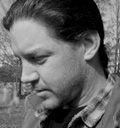|
The Turk
In a scapular motion Hitchcock would later come to study for years, Von Kempelman’s automaton arcs the black queen down to her mating square. Napoleon’s head begins to radish. 1809. In a North American forest, the canoe builders are burying their dead. The grandmaster sits inside the birch chamber watching Europe fall to pieces.
The Article
One must not tire of the article ‘a,’ Xenophon breathed into the downed man’s skull. Melissa…Melissa…Melissa…the soldier convulsed. Yes, the bees had done it. On the farther hillside, a dead boar had given up its wishbone for the elders’ soup. The mountain laurel kept its hand. Those tandem souls could never long for more than what you have become, X consoled. But the boy on the ground would not hear of it.
The Impaling
Bones, said the oracle to Pyrrha, as she sharpened the tip of Parnassus, I said bones. There had been a mix-up. Jupiter, in his growing disenchantment with the clones, had stood at the blue edge of tundra and given the signal. When it was all over, only Deucalion and his wife Pyrrha were left—little bits of kelp. Deucalion asked the oracle what can we do to bring back the gentle clones, the praying clones, the clones who gather dusk beyond the STOP signs? Cast your mother’s bones at once before you, said the oracle. Deucalion, seeing his poor Pyrrha weeping at the prospect of digging up her mother, conveniently interpreted the oracle’s message to mean the bones of Mother Earth. Thus, Pyrrha skitched her mother’s stones across a lake,the grit and pumice of each gently settling on the oracle’s thin and twitching eyes.
The Footprints
Stride and gait’ll get you where you want to go. Sarah watches her father sputter out at the end of a big “Z.” His feet melt into rock after 27 steps down the slope. On Roccamonfina the locals pray to Ciampate del Diavolo. Sarah doesn’t know this yet. A tree catches fire and lights the way for her aunt. Unlike your father, I will employ a vague mnemonic of whispering fish in my descent. 385,000 years later, scientists find a few of her handprints as well. |
